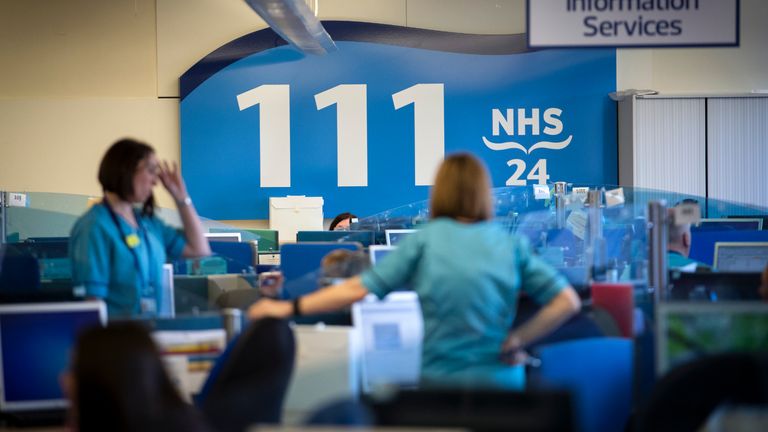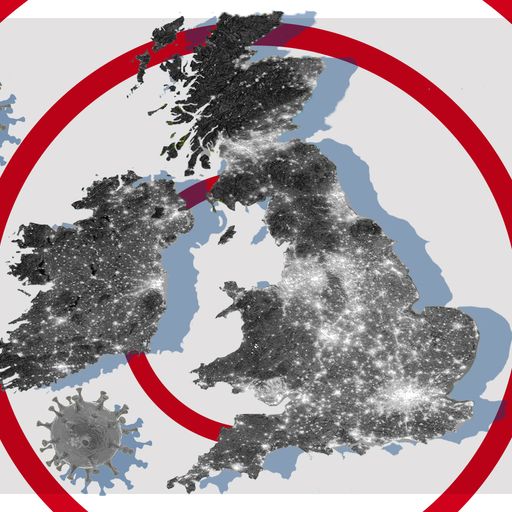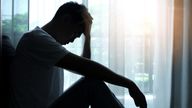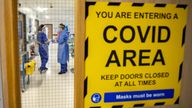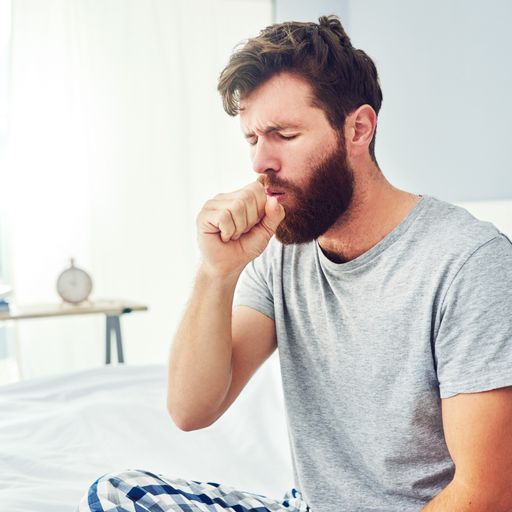Coronavirus: First death of COVID-19 patient in Scotland as UK cases reach 798
The latest figures come after the government escalated its COVID-19 response to the next stage and introduced new measures.
Friday 13 March 2020 20:01, UK
A patient in Scotland has died after testing positive for coronavirus - the country's first fatality linked to the virus.
Their death brings the total number of people with COVID-19 to have died across the UK to 11.
On Friday, the number of confirmed cases in the UK reached 798 - an increase of 208 over the last 24 hours.
In Wales, where there are 38 confirmed cases, all non-urgent surgical procedures and outpatient appointments have been suspended as preparations are made for an increase in people being treated for COVID-19.
According to the Department of Health, as of 9am on Friday a total of 32,771 people in the UK have been tested for COVID-19, with 97.6% found not to have the disease.
Scotland's chief medical officer Catherine Calderwood confirmed the latest death, saying the patient was "an older person who had underlying health conditions".
The patient died in a hospital covered by NHS Lothian, which includes Edinburgh, Midlothian, East Lothian and West Lothian.
Prime Minister Boris Johnson introduced new measures on Thursday as the government's coronavirus response escalated to the second phase - moving from trying to contain the virus to delaying its spread.
Anyone with a new persistent cough or a high temperature will now have to self-isolate and stay at home for seven days, and schools are being urged to cancel planned trips abroad.
The London Marathon, which was due to take place on 26 April, has been postponed until 4 October because of the coronavirus.
The event's director Hugh Brasher said: "The world is in an unprecedented situation grappling with a global pandemic of COVID-19 and public health is everyone's priority."
English football authorities have also suspended top level fixtures until 3 April, although the government has not yet ordered the banning of mass gatherings.
In other developments in the spread of COVID-19 in the UK:
- The Foreign Office advised against all but essential travel to the Spanish regions of Madrid, La Rioja and the municipalities of La Bastida, Vitoria and Miranda de Ebro
- Wales v Scotland Six Nations rugby match was postponed due to the coronavirus outbreak
- England's cricket tour of Sri Lanka was also called off
- Next week's Champions League and Europa League matches have been postponed
- A London Underground tube driver tested positive for the virus
- London's St Patrick's Day parade and celebrations this Sunday were cancelled
- The first cases of community transmission of COVID-19 not linked to travel were detected in Northern Ireland
The developments came as experts defended the government's response to the virus amid criticism from former health secretary Jeremy Hunt and others over the decision not to cancel large gatherings.
The UK's chief scientific adviser, Sir Patrick Vallance, said the government was not looking to "suppress" the disease entirely but to help create a "herd immunity in the UK" while protecting the most vulnerable from it.
He told Sky News around 60% of the UK population will need to become infected with coronavirus in order for society to have such immunity.
:: Listen to the Daily podcast on Apple Podcasts, Google Podcasts, Spotify, Spreaker
Sir Patrick said some of the social distancing measures put in place, including self-isolating for seven days if symptoms develop, were "actually quite extreme".
On Thursday, Ireland announced the closure of all schools and childcare facilities and other public spaces like museums, while Scotland banned gatherings of more than 500 people.
But the UK government said it would not close schools at the moment as the evidence for its effectiveness was lacking, though this would be kept under review.
The World Health Organisation has designated the global coronavirus outbreak as a pandemic.
